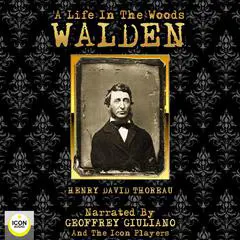 Play Audiobook Sample
Play Audiobook Sample
Walking Audiobook
 Play Audiobook Sample
Play Audiobook Sample
Quick Stats About this Audiobook
Total Audiobook Chapters:
Longest Chapter Length:
Shortest Chapter Length:
Average Chapter Length:
Audiobooks by this Author:
Publisher Description
A meandering ode to the simple act and accomplished art of taking a walk. Profound and humorous, companionable and curmudgeonly. Walking, by America's first nature writer, is your personal and portable guide to the activity that, like no other, awakens the senses and soul to the 'absolute freedom and wildness' of nature.
Download and start listening now!
"I believe I read this many years ago but revisited it this week as I attend the AVA convention in Orlando. I love to walk (it's right up there with reading) and this is a nice short essay basically that promotes walking not only for our soul but as a reflection of society and foreward yearning during the time this was written. I loved the quote regarding merchants who sit in their stores or offices all afternoon rather than taking a walk as Thoreau believes. He wonders why they haven't all committed suicide. I understand that as days without walks make me want to tear my hair out. He talks a lot about nature and going towards the southwest as all good explorers do. Good reminder to watch where you walk and though I can enjoy a city walk as much (or more) than a walk in the woods - Thoreau definitely had the right idea. What would he think of civilization in America now where so few people walk - encased in their cars and air-conditioned buildings. It leaves no room for grounding into the earth."
— Bookreaderljh (4 out of 5 stars)
Walking Listener Reviews
-
" My favorite book of all time! "
— April, 2/10/2014 -
" "...in Wildness is the preservation of the World." Thoreau's two essays in my version of the text, "Walking" and "Night and Moonlight" focus on the importance of not only appreciating existing wildness around us, but cultivating wildness in ourselves and the surrounding areas. Almost contradicting himself in some parts, he suggest that the Farmer is above the Indian, in that he believes that some cultivation and agriculture is better than leaving things lie. At the same time, he holds the view of his time that the Indians (read, Native Americans) are a primitive culture with no complex technology, saying that they would cultivate the land with a "clam shell." Despite this evidence of his time period and a few slight contradictions, I found these essays to be fresh and informative, still applicable in a time when nature seems to be slipping away through our fingers. Thoreau's places where "no man has stood before and no man will ever stand" are growing few and far between. "
— Gillian, 2/8/2014 -
" Rebecca Solnit, despite doing this like 200 years after this, did it better. But the reason I like Thoreau as a rhetorician is that he's never too annoying. He's very literal and he's very clear and rarely has incomprehensible, highfalutin' ideas. "
— Jennifer, 2/3/2014 -
" Seemed to drag a bit when he got off the topic of walking. More philosophizing than naturalist observation, but then he was dying when he wrote this. He uses some really wonderful turns of phrase. "
— Karen, 2/3/2014 -
" Thoreau's philosophy on the importance of considering nature in everyday life through the application of one rather simple action which most either neglect or haven't time for... walking... "
— Marts, 1/22/2014 -
" It is not a written experience on walking rather a walking experience in writing, whatever that means. "
— Deema, 1/14/2014 -
" As always Thoreau writes of Nature in a way that makes you yearn to be outdoors in the elements and observe what is in the world around you. "
— Jim, 1/13/2014 -
" nice short read philosophising on why we walk, and nature. "
— Dylan, 1/4/2014 -
" simple, to the point and brilliant. "
— Jessica, 12/29/2013 -
" I've never read anything by Thoreau before. He certainly paints some pretty pictures. "
— Matthew, 12/5/2013 -
" I always feel guilty that I don't enjoy Thoreau more. I found Walking interesting, but I was glad when I was done reading. Luckily it was a short book. I'll continue to read Thoreau. Maybe some day I'll see the light. "
— Pat, 11/29/2013
About Henry David Thoreau
Henry David Thoreau (1817–1862) was an American essayist, naturalist, philosopher, and poet. Born at Concord, Massachusetts, and educated at Harvard, he began his career as a teacher. Through his older friend and neighbor, Ralph Waldo Emerson, he became a part of the Transcendentalist circle and one of that group’s most eloquent spokespersons. He is best known for his book Walden and his essay “On the Duty of Civil Disobedience.”










































